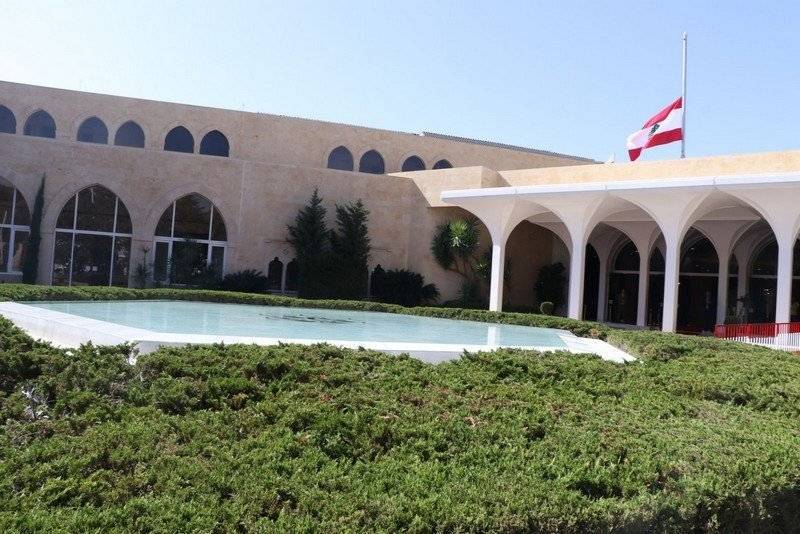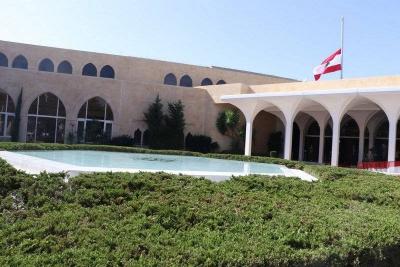The newspaper "Al-Jomhoria" reported that political, financial, judicial, and banking matters intertwined yesterday amid preparations for the parliamentary elections scheduled for mid-May. There are concerns about potential delays, particularly as some political factions are ramping up their rhetoric, which could lead to public unrest exacerbated by the ongoing economic, financial, and living crises. The issue of maritime border demarcation between Lebanon and Israel is expected to be addressed in a presidential meeting taking place today at the presidential palace, involving President Michel Aoun, Speaker of Parliament Nabih Berri, and Prime Minister Najib Mikati. This meeting aims to discuss the report submitted by the committee that examined the proposal from U.S. mediator Hochstein regarding the demarcation.
According to information obtained by "Al-Jomhoria," the committee has prepared a draft response to the U.S. mediator's proposal, covering all technical, legal, and financial aspects, which will be reviewed by the three presidents for a decision. The newspaper noted that this presidential meeting may not reach a final decision and could remain open for further consideration before Lebanon's official final stance is communicated, keeping in mind that there is time until the end of March for submitting this response to the U.S. mediator.
Furthermore, well-informed sources told "Al-Jomhoria" that Lebanon is facing a pivotal test, warning that without reaching sustainable solutions through agreements with international institutions and the International Monetary Fund (IMF) to initiate real remedies for the economic and financial crisis, Lebanon risks losing international attention, which could lead to negligence regarding its situation. According to these sources, a government official warned that losing this opportunity might mean Lebanon may not be able to afford even a box of matches next year, especially with the ongoing depletion of remaining dollars at the Central Bank of Lebanon.
In a related development, the Attorney General of Mount Lebanon, Judge Ghada Aoun, issued a decision yesterday to detain Raja Salameh, the brother of Central Bank Governor Riad Salameh, after questioning him and conducting investigations for three hours in the presence of his legal representative. This follows a report submitted by the legal department of the "Justice Pioneers" group, represented by lawyer Haitham Azzou and several other lawyers, regarding money laundering and illegal enrichment to the detriment of the Central Bank's treasury. Aoun referred Raja Salameh to the investigative judge to probe "suspicions related to money laundering, embezzlement, illegal enrichment, and smuggling large amounts of money abroad," which are the same suspicions that Judge Aoun is pursuing against the Central Bank Governor.
It is up to the investigative judge to decide whether to keep Raja Salameh detained or to investigate him following his release. Aoun was quoted by the "New" channel stating that the Central Bank Governor "used his brother's name and the fictitious companies Raja had set up in his name to register properties in France worth nearly $12 million." When questioned about summoning Riad Salameh, Aoun replied, "Yes, we previously summoned him, and you saw what happened. We will try to contact him again, and if he does not come, we will see what we can do; perhaps he will come this time."
On another note, sources monitoring the current confrontation between banks and some parts of the judiciary told "Al-Jomhoria" that this confrontation can only be described as chaos, which is the number one enemy of the economy, striking at its core. Judicial rulings against banks continue to emerge without a law regulating the chaos that began when the Lebanese state declared a halt to payments (bankruptcy), without the necessary measures to clarify the fate of people's funds, the banking sector, and the Central Bank... The "capital control" law remains just a mirage, and the lack of legislation thus far enables this chaos, and it is no longer clear what the objective is or where it might lead.
In this context, Paul Marquess, head of the "Justicia for Development and Human Rights" organization, warned through "Al-Jomhoria" about the repercussions of disparate judicial decisions against banks, stating, "While we support the protection of depositors' rights, we fear that these judicial decisions, even if some of them are well-intentioned and aim to uphold depositors' rights, might be detrimental to them. If the relevant individual in the decision is not aligned with the general depositors, the court may have fulfilled the rights of a specific depositor, but the bank in question might decide to comply with the judicial ruling and complicate matters for depositors by maintaining existing seizures and refraining from banking transactions, potentially leading to a strike within the banking sector, in addition to the reputational risks affecting correspondent banks' dealings with Lebanese banks, which will be more cautious in their transactions with us."
Meanwhile, unsettling atmospheres indicative of a suspicious scheme surrounding the fabricated confrontations between certain judicial authorities and banks have started to emerge in the country. Questions arise regarding the dubious timing of this confrontation. There are two interpretations of this timing, both leading to "devastation." The first interpretation speaks of electoral goals, as a faction within the ruling system believes that this approach to ignite the situation against banks will serve to attract additional votes in the parliamentary elections. The second interpretation suggests a scheme aiming to push banks into a strike, leading to chaos in the streets due to hindrances to people's interests and their inability to obtain their financial rights (salaries, deposits, etc.), ultimately resulting in widespread chaos and unrest, justifying the postponement of the election date.
In any case, the situation appears suspicious and concerning, potentially deepening the hardships faced by people in the upcoming phase.
In the meantime, a delegation of International Monetary Fund experts is scheduled to visit Beirut before the end of the month to continue discussions with the Lebanese authorities, as confirmed by IMF spokesperson Jerry Rice yesterday. He stated: "We remain in close contact with the Lebanese authorities and are trying to work with them to formulate a reform program that can address the severe financial and economic challenges Lebanon is facing." He added: "I would like to say that discussions are progressing well, but intense work is needed in the coming period. Lebanon's challenges are deep and complex and will require time and commitment," without providing further details.
On another side, the UN Security Council held closed consultations yesterday regarding the report of UN Secretary-General Antonio Guterres on implementing Resolution 1701 and the situation in Lebanon. The Council listened to a briefing from the UN Special Coordinator in Lebanon, Joanna Frontera, and the UN Under-Secretary-General for Peace Operations, Jean-Pierre Lacroix. Frontera provided insights into the ongoing preparations for the parliamentary elections, emphasizing "the need for reliability and predictability, particularly concerning finalizing the election budget and legislative framework and ensuring the effectiveness of the election oversight body." She stated, "Lebanese voters need and deserve certainty and the ability to make their voices heard," hoping especially "for women to participate actively in the elections as voters and candidates." She noted with concern the continuing social and economic deterioration, the suffering of the Lebanese people, and the erosion of the public sector, underscoring "the urgent necessity for implementing concrete reforms." She also highlighted the importance of having "a fair and credible economic and financial vision, sound fiscal management, tangible reforms in the electricity sector, an agreement with the International Monetary Fund, an independent judiciary, as well as good governance and anti-corruption measures."
Frontera urged full compliance with all provisions of Security Council Resolution 1701, confirming "the fragility of the relative calm between Lebanon and Israel." She encouraged member states to continue providing support to the Lebanese Army and all state security institutions, specifically noting the impact of the crisis and the role these institutions play in providing security and stability during the upcoming electoral period. She reiterated the UN's calls for "a neutral, comprehensive, and transparent investigation into the Beirut port explosion to uncover the truth and achieve justice for the victims."




